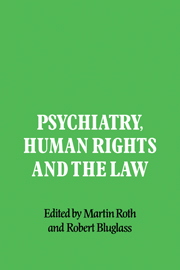Book contents
- Frontmatter
- Contents
- Editors' preface
- Contributors
- The historical background: the past 25 years since the Mental Health Act of 1959
- The social and medical consequences of recent legal reforms of mental health law in the USA: the criminalization of mental disorder
- The recent Mental Health Act in the United Kingdom: issues and perspectives
- Medical and social consequences of the Italian Psychiatric Care Act of 1978
- Lessons for the future drawn from United States legislation and experience
- Recent developments in relation to mental health and the law in the Federal Republic of Germany
- Psychopathy and dangerousness
- Dangerousness in social perspective
- Psychiatric explanations as excuses
- Detention of patients: administrative problems facing Mental Health Review Tribunals
- Developments in forensic psychiatry services in the National Health Service
- The role of psychiatry in prisons and ‘the right to punishment’
- Human rights in mental health
- Changes in mental health legislation as indicators of changing values and policies
- The Danish experience: one model of psychiatric testimony to courts of law
- A postscript on the discussions at the Cambridge Conference on Society, Psychiatry and the Law
The Danish experience: one model of psychiatric testimony to courts of law
Published online by Cambridge University Press: 04 August 2010
- Frontmatter
- Contents
- Editors' preface
- Contributors
- The historical background: the past 25 years since the Mental Health Act of 1959
- The social and medical consequences of recent legal reforms of mental health law in the USA: the criminalization of mental disorder
- The recent Mental Health Act in the United Kingdom: issues and perspectives
- Medical and social consequences of the Italian Psychiatric Care Act of 1978
- Lessons for the future drawn from United States legislation and experience
- Recent developments in relation to mental health and the law in the Federal Republic of Germany
- Psychopathy and dangerousness
- Dangerousness in social perspective
- Psychiatric explanations as excuses
- Detention of patients: administrative problems facing Mental Health Review Tribunals
- Developments in forensic psychiatry services in the National Health Service
- The role of psychiatry in prisons and ‘the right to punishment’
- Human rights in mental health
- Changes in mental health legislation as indicators of changing values and policies
- The Danish experience: one model of psychiatric testimony to courts of law
- A postscript on the discussions at the Cambridge Conference on Society, Psychiatry and the Law
Summary
The theme of my paper, experiences in respect of psychiatric testimony to courts of law, is obviously wide-ranging and of general forensic importance, which necessitates a rather restricted delimitation. So, on the basis of experiences from my own country, Denmark, I have chosen to subdivide the subject as follows:
To describe the general lines laid down by the Director of Public Prosecutions to help characterise those categories of psychically anomalous offenders in which the question of applying special measures or sanctions might arise.
With the provisions of the Danish Penal Code as the starting point, I shall discuss the psychiatric criteria which must be fulfilled before sanctions, alternative to punishment, are considered applicable.
Finally I shall review the actual procedure or practice in Denmark as regards the production of psychiatric testimony in court.
Historical background
By way of introduction, however, a short historical outline might be useful. Considering the small size of my country this might sound pretentious, but it is my impression – and thereby my justification – that the developments in Denmark within this field might be regarded as representative of the developments in the western world as a whole. In 1930 the Danish Penal Code was fundamentally revised, particularly as regards the provisions dealing with psychically anomalous offenders. This revision came at a time characterized by great optimism and confidence regarding the effect of psychological and psychiatric treatment as opposed to punishment, treatment being considered the most appropriate sanction for preventing criminal relapse. The ideology of treatment represented the prevailing opinion at this time among not only forensic psychiatrists, but quite a number of progressive jurists as well.
- Type
- Chapter
- Information
- Psychiatry, Human Rights and the Law , pp. 215 - 227Publisher: Cambridge University PressPrint publication year: 1985

